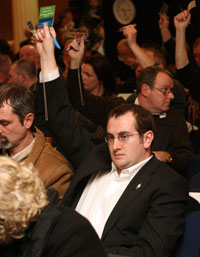11 March 2010 Edition
Hospital waiting woes highlighted

Paul Hogan (Athlone) voting at the Ard Fheis
BY AINE DOWNESPublic services have been dealt the full force of the Fianna Fáil led government and their agenda of cuts this year and this was reflected in the contributions of delegates on Saturday morning during the section on envionment and public services..
Caoimhghín Ó’Caoláin, TD for Cavan/Monaghan, opened the section with a contribution on health. In his speech he reaffirmed Sinn Féin’s commitment “to an all-Ireland single tier, universal health system with equal access for all based on need alone and funded from general progressive taxation.” He said that “this is the only fair and efficient alternative to the chaos which reigns at present”.
He noted that since last year’s Ard Fheis, the Fianna Fáil/Green government has stepped up its attacks on our public health services, citing the proposed removal of 1,100 acute hospital beds and the imposition of prescription charges of up to €10 per month on medical card holders.
Councillor Pádraigín Ní Mhurchadh from Monaghan spoke passionately of how the removal of acute services from Monaghan General Hospital had affected the town and surrounding area. She spoke of the ideology of the “regressive democrats” which has led to such a decimation of vital services. Stark and shocking pictures were painted of a man bleeding to death in a corridor because of long waiting times and of patients left sitting in chairs for days waiting on treatment. Pádraigín appealed to Fianna Fáil and particularly the Greens to act on this most fundamental of issues – the right to decent healthcare.
 Patrick Daly from Dublin Ógra Shinn Féin spoke on the issue of third level education, the increase in the student registration fee and the withdrawal of student services. Patrick questioned the government’s empty rhetoric of “building a knowledge economy”, saying it was more likely that ministers had more interest in their Mercs and expenses than they did in building any sort of a knowledge economy.
Patrick Daly from Dublin Ógra Shinn Féin spoke on the issue of third level education, the increase in the student registration fee and the withdrawal of student services. Patrick questioned the government’s empty rhetoric of “building a knowledge economy”, saying it was more likely that ministers had more interest in their Mercs and expenses than they did in building any sort of a knowledge economy. Patrick noted that “there has been a 65% jump in the student registration fee since its inception”. He likened this jump in registration fees to “student fees through the back door”. He also drew attention to the fact that monies collected through this registration fee, which are supposed to be used as funding for students services, in many cases are being used to fund administration costs and paying off college debt. He noted from his own experience that many clubs, societies and gyms have had to close down and libraries and laboratories have had to reduce opening hours due to lack of funds.
The government’s mishandling of recent flooding also came in for criticism. Councillor Paul Hogan from Athlone said that he had witnessed firsthand entire communities cut off and marooned by the deluge of water and roads which were impassable. He said: “Flood plains act as a natural barrier to the spread of flood water. During the economic boom, the 26 county government became overdependent on the construction sector and allowed, with virtually no restrictions, developments on flood plains.”
